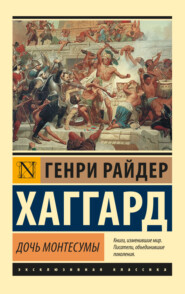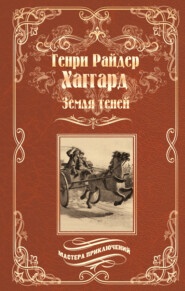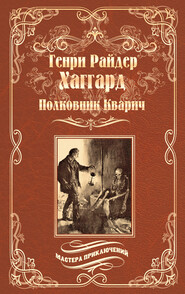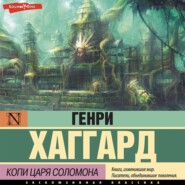По всем вопросам обращайтесь на: info@litportal.ru
(©) 2003-2024.
✖
Belshazzar
Настройки чтения
Размер шрифта
Высота строк
Поля
All that morning the Babylonian multitude came on slowly, till by noon they were within a mile of us. During the heat of the day they rested for some two hours or more, then once more they advanced, as we thought to the attack. But it was not so, for when they had covered another three furlongs again they halted as though bewildered, perhaps because they could see so few of us, for the most of our army was hidden behind the crest of a hill. At length officers rode forward, five or six of them, carrying a white flag, and reined up almost at the foot of the hills.
Amasis sent some forward to speak with them, among whom was Belus whose tongue was their own, disguised as an Egyptian captain, a garb that became him ill. They talked a long while. Then Belus and the others returned and reported that the Prince and General, Merodach, gave us leave to retire unmolested, also that he offered a great present of gold to Amasis and his captains, if this were done. Then, he said, he would retire to Babylon and make it known to the King Nebuchadnezzar that he had gained a victory over the Egyptians, who had fled at the sight of his army.
When Amasis heard this, he laughed. Nevertheless he sent back Belus and the others to ask how much gold Babylon would pay as a tribute to Pharaoh, and so it went on all the afternoon, till at length Amasis knew that it was too late for the Babylonians to attack, for night drew near. Then he sent a last message, demanding that the Babylonians should surrender and give hostages; also the gold that they had offered. This was the end of it.
Later Belus came and told me the meaning of this play. “Those Babylonians have no water,” he said, “save what they carry with them. To-morrow they will be thirsty and drink all, leaving nothing for the horses and the elephants, that they thought would drink at the springs of the oasis to-night. Truly Amasis is a good general.”
All that night we watched, thought with little fear for there was no moon and we knew that in such darkness the Babylonians would not dare to attack. Now I thought that Amasis would fall on them at the dawn, as we had done on the Syrians. But he did not, who said that thirst was the greatest of captains and he would leave him in command. Still when he had seen that all our army was well fed and all our horses were well watered, he sent out a body of cavalry, five thousand of them perhaps, with orders to charge at the centre of the Babylonians as they began to muster their array, and then suddenly to retire as though seized with panic.
This was done. When they saw the horsemen coming the Babylonians formed up with great shoutings, and the elephants were advanced. As if frightened at the sight of these elephants, our men wheeled about and fled back towards the hills, though not too fast. Now happened that which Amasis had hoped.
The enemy broke his ranks and pursued the Egyptians. Elephants, chariots and clouds of horse pursued them all mingled together, while after them came the bulk of the host. The word went down our lines to stand firm behind the crest of the hill. We opened and let our horsemen through, to re-form behind us, which they did, having scarce lost a man. Then we closed again and waited.
The hordes were upon us; chariots, horse and elephants toiled up the sandy slopes of the hills, slipping back one step for every two forward. At a signal our bowmen rose and loosed their arrows, cloud after cloud of arrows. Soon the heads and trunks of the elephants were full of them. Maddened with pain the great brutes turned and rushed down the hill, crushing all they met. The horses also, those of them that were not killed, did likewise, while the sand was strewn with dead or wounded men. The charge turned to a rout and few that took part in it reached the great army unharmed. Still, so vast was it that those who had fallen with their beasts were but a tithe of its numbers, though now few of the elephants were fit for service and the chariots and the horsemen had suffered much.
At this repulse rage seized the Babylonians or their generals. Trumpets blew, banners waved, words of command were shouted. Then suddenly the whole host, countless thousands of them whose front stretched over a league of land, began their advance against our little line of hills that measured scarcely more than four furlongs from end to end.
Amasis saw their plan, which was to encircle and closing in from behind, to overwhelm us with the weight of their number. He divided our horse into two bodies and weary as they still were from their journey against the Syrians, commanded them to charge round the ends of the hills and to cut through those wings, leaving the breast of the great host like a bull with severed horns. This they did well enough, charging forward, and back again through and through those Babylonians, or their allies, till between the horns and the head there were great gaps; after which they changed their tactics and charged at the tips of the horns, crumpling them up, till from ordered companies they became a mob.
Meanwhile the breast advanced, leaving a reserve to guard the waggons and the stores and the plain below.
Wave upon wave of the picked troops of Babylon, they dashed up at us, like breakers against a reef, and the real fight began.
We raked them with our arrows, killing hundreds, but always more poured on, till they came to the crest of the hills and met the Egyptians sword to sword and spear to spear.
I had no part in that fight who stood behind in reserve, with the General’s Legion that guarded Amasis and Egypt’s banners. Yet I saw it all and noted that many of those who attacked, were wasted with thirst, for their mouths were open and their tongues hung out, while the hot sun beat down upon their helms and armour.
Amasis saw it also, for I heard him say, “I thank the gods that they have given me no Babylonian prince to be the captain of my life. Now, on them, Egyptians!”
We rose, we charged, we drove them before us in a tumbled mass, down those blood-stained slopes we drove them; yes, there they died by the hundred and the thousand. At the foot of the hill we re-formed, for many of us had been killed or wounded in the great fray. Then we charged at the heart of the Babylonian host where flew the banners of their general, the Prince Merodach, a dense array of fifteen or twenty thousand of the best of their troops, set to guard the general, the women and the baggage. We fell on them like a flood, but were rolled back from their triple line as a flood is from a wall of rock. We hung doubtful whose force after all was small, when suddenly at the head of about a thousand of his guards, whom he had kept in reserve, Amasis himself charged past us. We, the rest of that legion, would not be left behind. Leaving our dead and wounded we charged with him. How it happened I do not know, but we broke the triple line, we went into it as a wedge goes into wood, and it split in two.
Suddenly I saw the inmost body of horsemen that surrounded the Babylonian standards, wheel about and gallop off. A soldier cried into my ear,
“Merodach flies! Yes, he flies. Babylon is beaten!”
So it was indeed, for when the host saw that their general had deserted them with his guard of chariots and horsemen, the heart went out of them. No longer were they battalions of brave men, nay, they became but as sheep driven by wolves or dogs. They packed together, they fled this way and that, trampling one upon the other. They fought no more, they flung down their arms, each man seeking to save his own life. The Egyptians slew and slew until they were weary. Then the trumpets called them back, save the horsemen that for a while followed the wings of the army which, seeing what had happened, abandoned hope and joined in the rout.
What happened to that host? I do not know. Thousands of them died, but thousands more wandered off into the desert seeking safety and water, but above all water at the wells in their rear. I can see them now, a motley crowd, elephants, camels, chariots, horse and footmen, all mingled together, till at length they vanished in the distance, except those who fell by the way. Doubtless many of them reached Babylon and told their tale of disaster into the ears of Nebuchadnezzar the Great King. But he was aged and it was said distraught, almost on his deathbed indeed, and had heard many such before. Always his hosts gathered from the myriads of the East, were going forth to battle. Sometimes they conquered, sometimes they were defeated. It mattered little, seeing that there were always more myriads out of which new hosts could be formed. In Babylon and Assyria and the lands around life was plentiful and cheap, for there men bred like flies in the mud and sun, and wealth was great, and when the king commanded they must go out to die.
The victory was won! Now came its fruits, the hour of plunder was at hand. There were the great parks of waggons filled with stores and women; there were the pavilions of the royal prince, the generals and the officers. Amasis himself, riding down our lines his helmet in his hand, laughing as ever, shouted to us to go and take, but to be careful to keep him his share.
We rushed forward without rank or order, for now there was nothing to fear. All the enemy were fled save those who lay dead or wounded, swart, black-bearded men. I, being young and swift of foot, outran my fellows. We came to the pavilion of the prince over which the banners of Babylon hung limply in the still air. The soldiers swarmed into it seeking treasure, but I who cared nothing for golden cups or jewels, ran round to another pavilion in its rear which I guessed would be that of the women. Why I did this I was not sure, for I wanted women even less than the other spoil; but I think it must have been because I was curious and desired to see what these ladies were like and how they were housed.
Thus it came about that I entered this place alone and letting fall the flap of the tent, which was magnificent and lined with silk and embroideries, stared round me till my eyes grew accustomed to the shadowed light and I saw that it was empty. No, not empty, for at its end, seated on a couch was a glittering figure, clad it seemed in silver mail, and beside it something over which a veil was thrown. Thinking that this was a man, I drew my sword which I had sheathed, and advanced cautiously.
Now I was near and the figure of which the head was bowed, looked up and stared at me. Then I saw that the face beneath the silver helm was that of a woman, a very beautiful woman, with features such as the Greeks cut upon their gems, and large dark eyes. I gazed at her and she gazed at me. Then she spoke, first in a tongue which I did not understand, and when I shook my head, in Greek.
“Egyptian, if so you be,” she said, “seek elsewhere after the others who are fled. I am no prize for you.”
She threw aside a broidered cape that hung over her mail, and I saw that piercing the mail was an Egyptian arrow of which the feathered shaft was broken off, also that blood ran to her knees, staining the armour.
I muttered words of pity, saying that I would bring a physician, for suddenly I bethought me of Belus.
“It is useless,” she said, “the hurt is mortal; already I die.”
Not knowing what to do, I made as though to leave her, then stood still, and all the while she watched me.
“You are young and have a kindly face,” said she, “high born too, or so I judge. Look,” and with a swift motion she cast off the veil from that which rested against her.
Behold! it was a child of three or four years of age, a lovely child, beautifully attired.
“My daughter, my only one,” she said. “Save her, O Egyptian Captain.”
I stepped forward and bent down to look at the child. At this moment some soldiers burst into the tent and saw us. Wheeling round I perceived that they were men of my own company.
“Begone!” I cried, whereon one of them called out,
“Why, it is our young captain, the Count Ramose, who woos a captive. Away, comrades, she is his, not ours, by the laws of war. Away! and tell the rest to seek elsewhere.”
Then laughing in their coarse soldier fashion, they departed and presently I heard them shouting that this tent must be left alone.
“Save her, Count Ramose, if such be your name,” repeated the woman. “Hearken. She is no mean child, for I am a daughter of him who once was King of Israel. Now at the last I grow clear-sighted and a voice tells me to trust you whom my God has sent to me to be my friend. Swear to me by him you worship that you will guard this child, yours by spoil of war; that you will not sell her on the market, that you will keep her safe and clean, and when she comes to womanhood, suffer her to wed where she will. Swear this and I, Mysia, of the royal House of Israel, will call down the blessing of Jehovah on you and yours and all your work, as should you fail me, I will call down His curse.”
“A great oath,” I exclaimed hesitating, “to be taken by one who is no oath breaker.”
“Aye, great, great! Yet, hearken. She is not dowerless.”
She glanced about her wildly to make sure that we were alone, then from her side, or perhaps from some hiding-place in the couch, she drew a broidered bag, and thrust it into my hands.
“Hide it,” she said. “These royal jewels are her heritage; among them are pearls without price.”
I thrust the bag into the pouch I carried, throwing from it the water bottle and the food which it had contained. Then I answered,
Вы ознакомились с фрагментом книги.
Приобретайте полный текст книги у нашего партнера:
Приобретайте полный текст книги у нашего партнера:

















